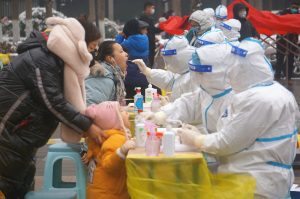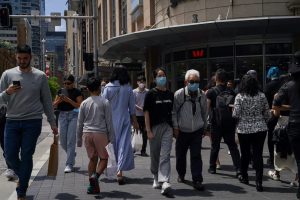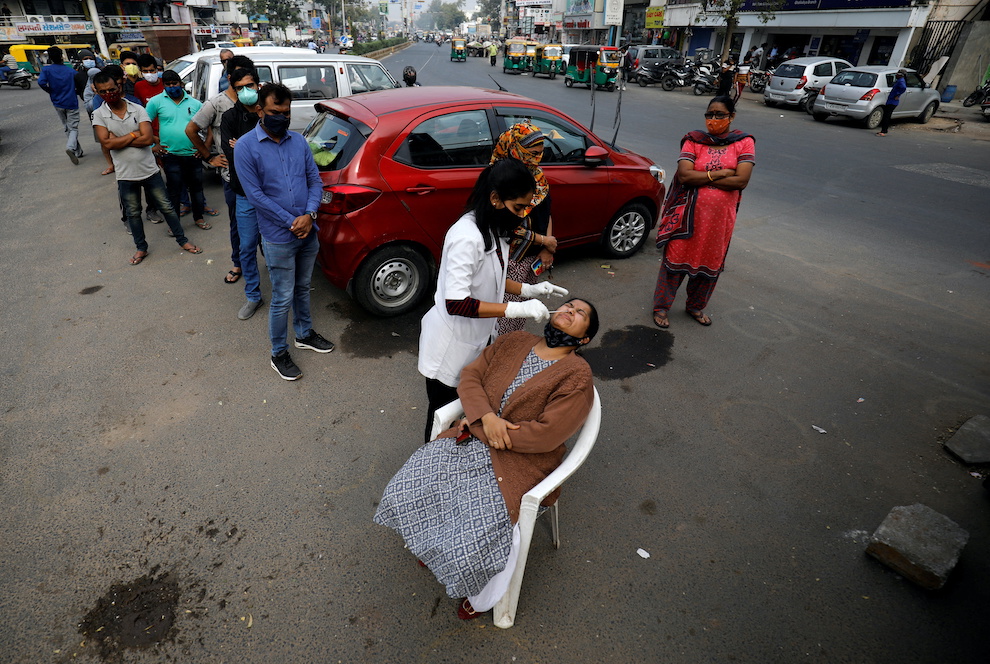The Omicron variant of the coronavirus has become a major headache for governments, health workers and vast numbers of people all across Asia.
The situation looks serious in India and in the Philippines, where high and rapidly increasing caseloads have been reported over recent days.
On Saturday, a record 43.7% of more than 70,000 people tested in the Philippines were found to have the virus.
President Rodrigo Duterte later ordered the arrest of unvaccinated people who will violate stay-at-home orders, in a bid to curb the “galloping” rise in cases driven by the Omicron variant, Al Jazeera reported.
Meanwhile, citizens in China, Thailand and Australia are also experiencing significant disruption, while the United States has agreed to a request from Tokyo to impose stricter Covid measures amid concerns about outbreaks at its bases in Japan.
India Facing a Third Wave?
India reported 159,632 new Covid cases on Sunday, as the Omicron variant of the coronavirus continues to spread rapidly in the country, nudging several state governments to impose fresh restrictions.
Schools and colleges have been closed in Maharashtra, the country’s richest state, until February 15 after daily cases in the state jumped to over 41,000. Local authorities said on Saturday they would close swimming pools and gyms from Monday.
The state government has said only fully vaccinated people will be allowed into private offices while limiting the capacity to 50% of the total workforce.
In the neighbouring state of Gujarat, authorities have extended night curfew hours and cancelled leave for all healthcare personnel.
Prime Minister Narendra Modi will chair a meeting to review the Covd-19 situation later on Sunday, according to government sources.
The health ministry reported 327 new deaths, taking the official death toll since the start of the pandemic to 483,790 – although experts say several million deaths are likely to have gone unreported. Total infections now stand at 35.52 million.

‘Stay home’ order to 14 million in Tianjin
The northern Chinese city of Tianjin on Sunday advised its nearly 14 million residents to stay home while mass testing is conducted after a spate of recent cases, including two of the Omicron variant, state-controlled media said.
Tianjin emerged as a new area of concern after more than 20 Covid cases were reported there in the last few days, according to the National Health Commission.
Tianjin, a major port 150km southeast of Beijing, launched its mass testing early on Sunday, advising residents to stay at or near home to be available for the community-level nucleic-acid screening. So far, however, no larger lockdown order was seen.
Chinese authorities were already struggling with a larger outbreak centred on the northwestern city of Xi’an that has sparked questioning of the country’s zero-tolerance policy of strict lockdowns and immediate mass testing to curb outbreaks.
Xi’an was locked down last month, forcing its 13 million residents indoors. New case numbers there have slowed in recent days.
Tianjin residents have been told they will not receive a “green” code on smartphone Covid-tracing apps, that nearly all citizens require to use public transport and in other situations, until they obtain a negative test result.
China is sticking strictly to the zero-tolerance approach as outbreaks continue to emerge in the run-up to next month’s Beijing Winter Olympics.
The country, where the coronavirus was first detected in 2019, has thus far reported only a handful of Omicron cases. Its tally since the start of the pandemic is just over 100,000 cases, partly because it does not record asymptomatic cases. China’s official death toll has stayed under 5,000, but cases from the chaotic initial outbreak in Wuhan in early 2020 are widely believed to have been under-reported.

Stricter Controls on US Bases in Japan
The United States has agreed to impose stricter Covid-19 measures at its military bases in Japan, Japanese Prime Minister Fumio Kishida said on Sunday, amid concerns that outbreaks at bases have fuelled infection in local communities.
“We have agreed with the United States in principle that unnecessary outings should be controlled and prohibited, and we are discussing specifics now,” Kishida said during a programme by public broadcaster NHK.
Japan reintroduced coronavirus restrictions in three regions that host US bases, the first such emergency controls since September. Governors of the regions requested the tougher measures after seeing a surge in cases driven by the Omicron variant.
Kishida said Japan had urged the US to address the concerns at a virtual meeting of their foreign and defence ministers on Friday and other occasions.
Japan halted the entry of almost all foreign travellers in late November after the World Health Organisation listed Omicron as a variant of concern. But the US military moves staff in and out under a separate testing and quarantine regime.

Surge of Cases Down Under
Australia’s most populous state, New South Wales, recorded its highest number of daily Covid deaths on Saturday as the Omicron variant sweeps the country and lawmakers face pressure to close widening supply chain gaps.
The home to Sydney and a third of Australia’s 25 million people reported 16 deaths from the coronavirus in the previous day. New South Wales reported 30,062 new infections, near record levels, while Victoria, the second-largest state, Victoria, reported 44,155 new Covid cases and four deaths.
The country reported just under 100,000 cases overall, down from a record 116,025 the previous day, but still surpassing most previous peaks. Total deaths for the day were 36.
With the surge bringing a rush for government-funded pop-up testing clinics, the authorities have urged people to take rapid antigen tests at home instead, then report positive results to their doctor, who enters it into a database.
“We have seen very low rates of significant illness,” Federal Health Minister Greg Hunt told reporters. Impacts on workplaces were the “principal challenge at this point in time,” he said.
Australia plans to start vaccinating children aged 5 to 11 on Monday. Despite the outbreak, political leaders say Australia’s high vaccination rate – more than 90% of people over 16 are fully vaccinated – justifies a reopening plan once figures decline.
• Jim Pollard, with Reuters and AFP.
ALSO SEE:
Thailand Takes a Middle Path to Manage Omicron Surge
China’s Zero Covid Policy to Unsettle Markets This Year: Eurasia
























